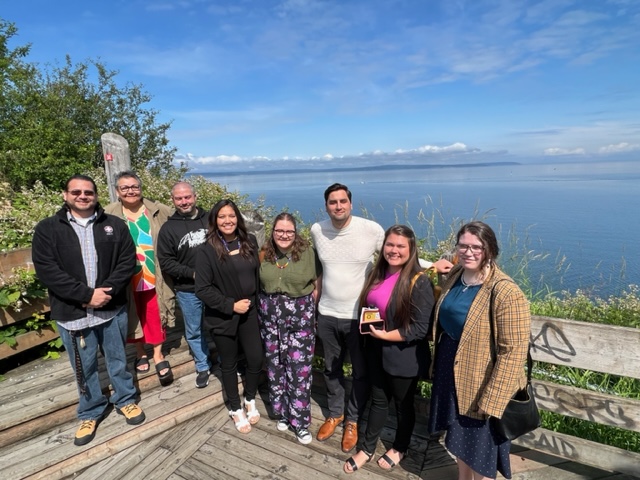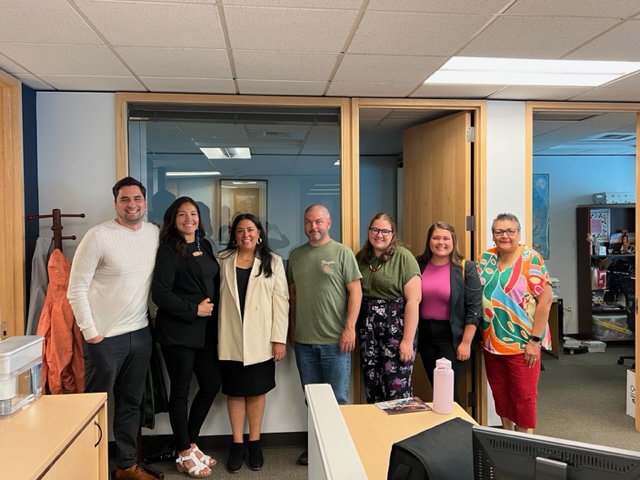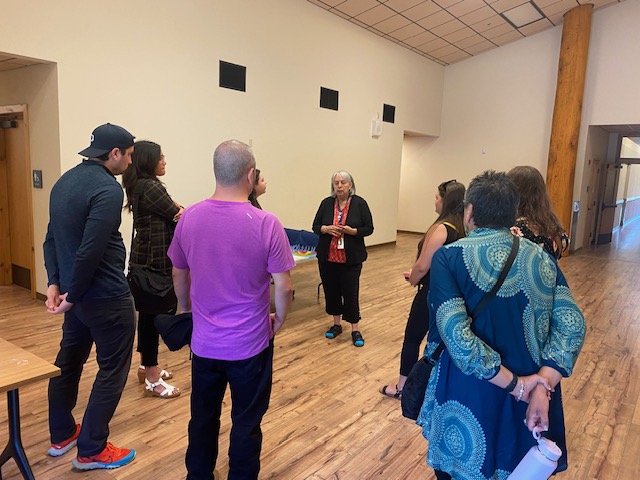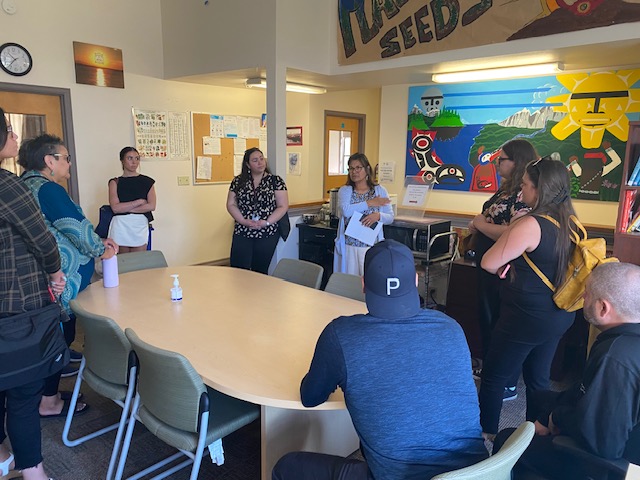‘Closing the Skills Gap’ an IVLP for Indigenous Education & Skills-training
June 20th, 2023
IVLP participants with Gabriel de los Angeles (center), at Chief Seattle Club's Day Center in Pioneer Square.
From June 20th to 24th, the World Affairs Council had the privilege of hosting six Indigenous Canadian leaders working across various sectors of Indigenous education - including in policy, community services, and higher education. These professionals traveled to Seattle as participants in the International Visitor Leadership Program (IVLP),
 the U.S. Department of State’s premier professional exchange program, which brings current and emerging leaders from around the world to the United States for three weeks of programming meant to cultivate enduring, global relationships with their American counterparts.
the U.S. Department of State’s premier professional exchange program, which brings current and emerging leaders from around the world to the United States for three weeks of programming meant to cultivate enduring, global relationships with their American counterparts.
This IVLP program, “Closing the Skills Gap: Indigenous Education and Skills-Training”, focused on highlighting practices and lessons in overcoming cultural and educational barriers faced by Indigenous and underserved communities, and promoting the full involvement of Indigenous communities in the economy through skills-training. Their professional programming in Seattle consisted of visits to and conversations with Indigenous leaders and Indigenous-run organizations across Washington state. This included meetings with United Indians of All Tribes, Eighth Generation, Northwest Indian College, and Chief Seattle Club.
June 21st - National Indigenous Peoples Day in Canada - was the group’s first day of programming in Seattle. With the history and cultural significance of the day in mind, the group headed to the Daybreak Star Indian Cultural Center at Discovery Park. The Daybreak Star grounds serve as a public community center for Native Americans across the Seattle area as well as the United Indians of All Tribes Foundation (UIATF) headquarters. The group was greeted at Daybreak by Alexsander Gladstone Bigwolf, Director of the Native Workforce Services Program (NWSP) at UIATF, Siobhan Barrett, Director of the Daybreak Star Veteran Pathfinder Program, and Kolbi Monasmith, Program Coordinator with NWSP.
The meeting began with a tour of the facilities and outdoor grounds at Daybreak Star. Kolbi and Siobhan discussed the building’s history, current community programs, and Daybreak’s permanent art collection featuring the works of Native artists and traditional Northwest Native culture. They were then guided outside to view the surrounding grounds at Daybreak including the Powwow grounds, and the viewpoint just off the building with breathtaking views of the Puget Sound.

Alexander Gladstone Bigwolf, Director of NWSP (left) and Kolbi Monasmith, NWSP Program Coordinator (right) pictured with IVLP particpants at Daybreak Star Community Center.
From Daybreak, Alexsander, Siobhan, and Kolbi escorted the group just outside of Discovery Park to the UIATF’s Labateyah Youth Home. At Labateyah, the group heard from staff about the services provided to Native youth, who are disproportionately at-risk for and affected by homelessness in Seattle. They discussed how their services aim to connect Native individuals aged 18-24 who are experiencing homelessness or fleeing domestic violence to medical, educational, skills-training, and case management resources - all while providing crisis-housing and re-housing services.
Following the visit and site tour at Labateyah, Alexsander and other members of the Native Workforce Services Program (NWSP) staff graciously joined the group for lunch, where they discussed the work NWSP does to support comprehensive employment of Native people in Seattle and how their programs help lead to a skilled workforce. Following a thoughtful and candid morning discussion about the educational, housing, and workforce challenges faced by Indigenous people in Seattle, the group headed to their next meeting.

NWSP Staff join IVLP participants for lunch and a closing discussion.
For the afternoon, the group was joined by Colleen Echohawk, a career advocate for Seattle’s native population. Colleen met with the group in her current role as CEO of Eighth Generation, a Native lifestyle brand that, as a participant in a global economy, is working to promote and sell Native art as compared to “Native-inspired art”. Colleen discussed her background and prior experiences as former Executive Director of Chief Seattle Club and a member of the Community Police Commission, roles which have allowed her to work towards combating racism in the community and addressing prominent challenges to vulnerable communities.
Colleen spoke to the ‘Closing the Skills Gap’ participants about her responsibilities as CEO at Eighth Gen to empower Native voices and artists, the challenges of advertising and promoting Eighth Gen products and Native art to buyers outside of the Indigenous-community, and her global vision for the future of the company. The session was closed with a sampling of Eighth Generation’s pieces including their signature wool blankets, jewelry, and tote bags. The visitors each walked away with some Eighth Generation stickers by which they can remember their inspiring conversation with Colleen to continue to push for advancements for Indigenous rights.

Colleen Ecohawk, CEO of Eighth Generation (3rd from left) with IVLP participants.
The second day of programming in Seattle, and a true highlight of the group’s IVLP experience, was a trip up to Bellingham, not far from the Canadian border, to visit Northwest Indian College (NWIC). Located on the Lummi Indian Reservation, the group began with a tour of NWIC’s campus, and an in-depth conversation about the history of the area and the origins of the school. The group was greeted and led around campus by Natasha Brennan, Public Information Officer, at NWIC. The walk around campus included tours of the NWIC Library, administrative offices, the Kwina building, home to the university’s Bachelor of Arts in Tribal Governance & Business program, as well as the Salish Seas Research Center, the state-of-the-art lab at NWIC that is producing research on algal toxins, in conjunction with NOAA.
After a comprehensive tour of campus, the group sat down with faculty and staff at NWIC for a larger conversation surrounding the importance of tribal colleges, the programs NWIC offers, the accreditation process, and how Indigenous culture, language, and teachings are at the forefront of an NWIC education.
They heard from Emma Norman, PhD and Department Chair for the Associate of Arts (A.A.) and Bachelor of Science (B.S.) degree programs in Native Environmental Science about the challenges of student success, and practices that NWIC programs take to work with students to ensure that educational success is accessible to them.
The group was also joined by Interim Dean of Academics, Rudy Vendiola, who touched on the process of becoming a fully accredited 4-year institution, as well as the challenges posed to the school operating in a post-Covid academic climate. The half-day visit to Lummi was a truly enriching experience for the delegates and provided insights and inspiration for changes and improvements at their own academic institutions.

Northwest Indian College faculty and IVLP participants after roundtable discussion.

IVLP participants in the Kwina Building on NWIC Campus at the Lummi Indian Reservation.
 IVLP participants learning about the origins of NWIC and the history of the buildings.
IVLP participants learning about the origins of NWIC and the history of the buildings.
Friday, June 23rd, marked the last day of professional development in Seattle, and the final day of the delegation’s three-week IVLP program. To conclude their time in Seattle, the group visited Chief Seattle Club, a “Native led housing and services organization” based out of Pioneer Square. At Chief Seattle Club, Gabriel de los Angeles, Communications Manager and Snoqualmie Tribal Member, spoke about the organization’s programs and their aim to spiritually, culturally, and physically serve the urban-Native population in Seattle. He was able to discuss the new permanent housing projects, and the services, including food, primary health care, legal services, and case management, that are offered out of the Day Center.

IVLP participants with Gabriel de los Angeles, Communications Manager (center) at Chief Seattle Club.
It was a fantastic experience for the IVLP participants to hear about the transformative actions taken by our local partners to improve access to education and services. The World Affairs Council would like to express a thank you to our Seattle partners for providing their time and space, and for sharing very personal experiences and histories with us. Finally, a thank you to an amazing group of IVLP participants and liaisons - hopefully the lessons learned from Seattle help to make global changes towards further ‘Closing the Skills Gap’!
About the author: Caitlin Kenney is a Program Coordinator with the Global Leadership Exchange team at the World Affairs Council, and a recent graduate of the University of Washington with a B.A. in International Security.